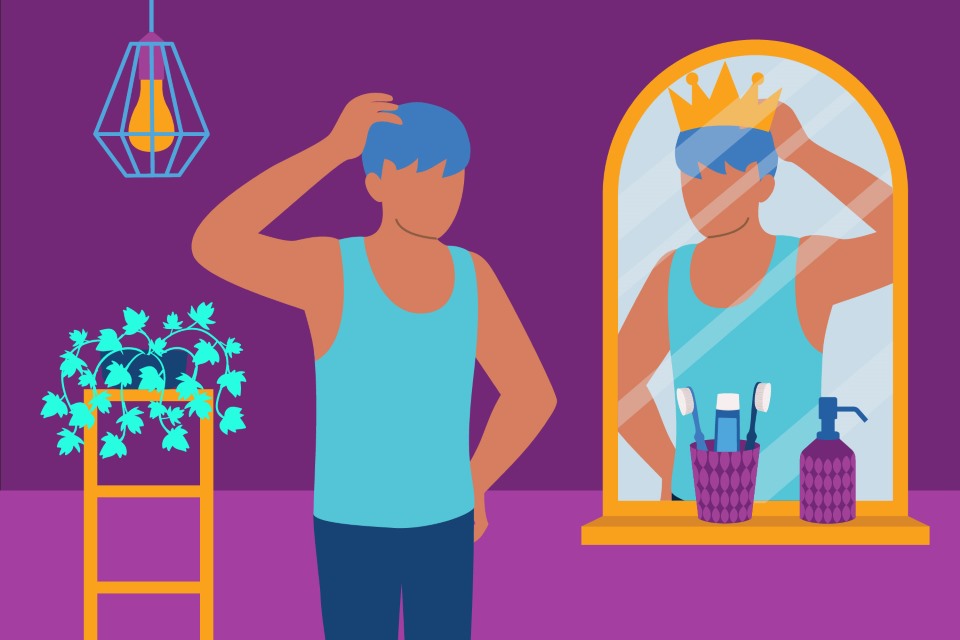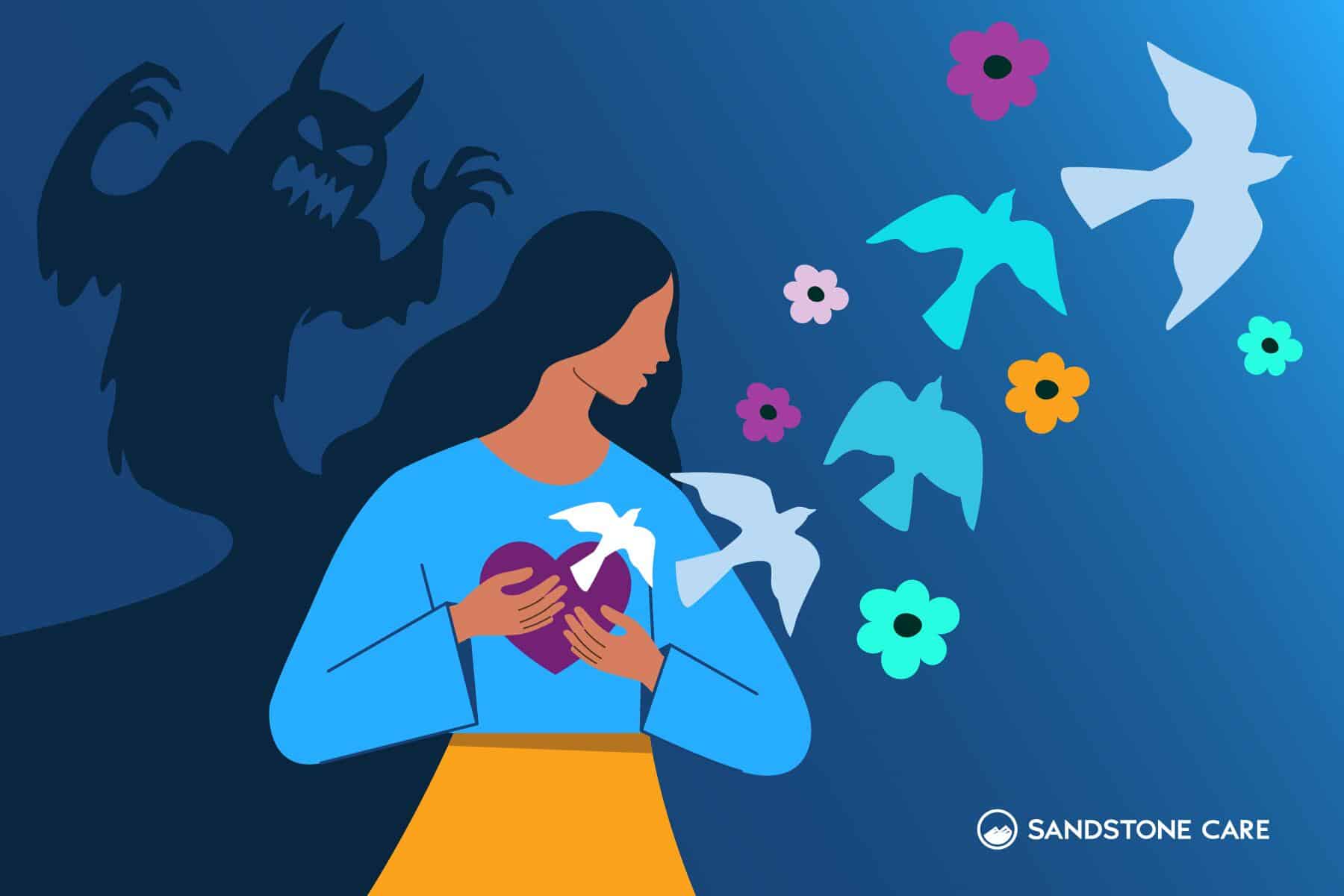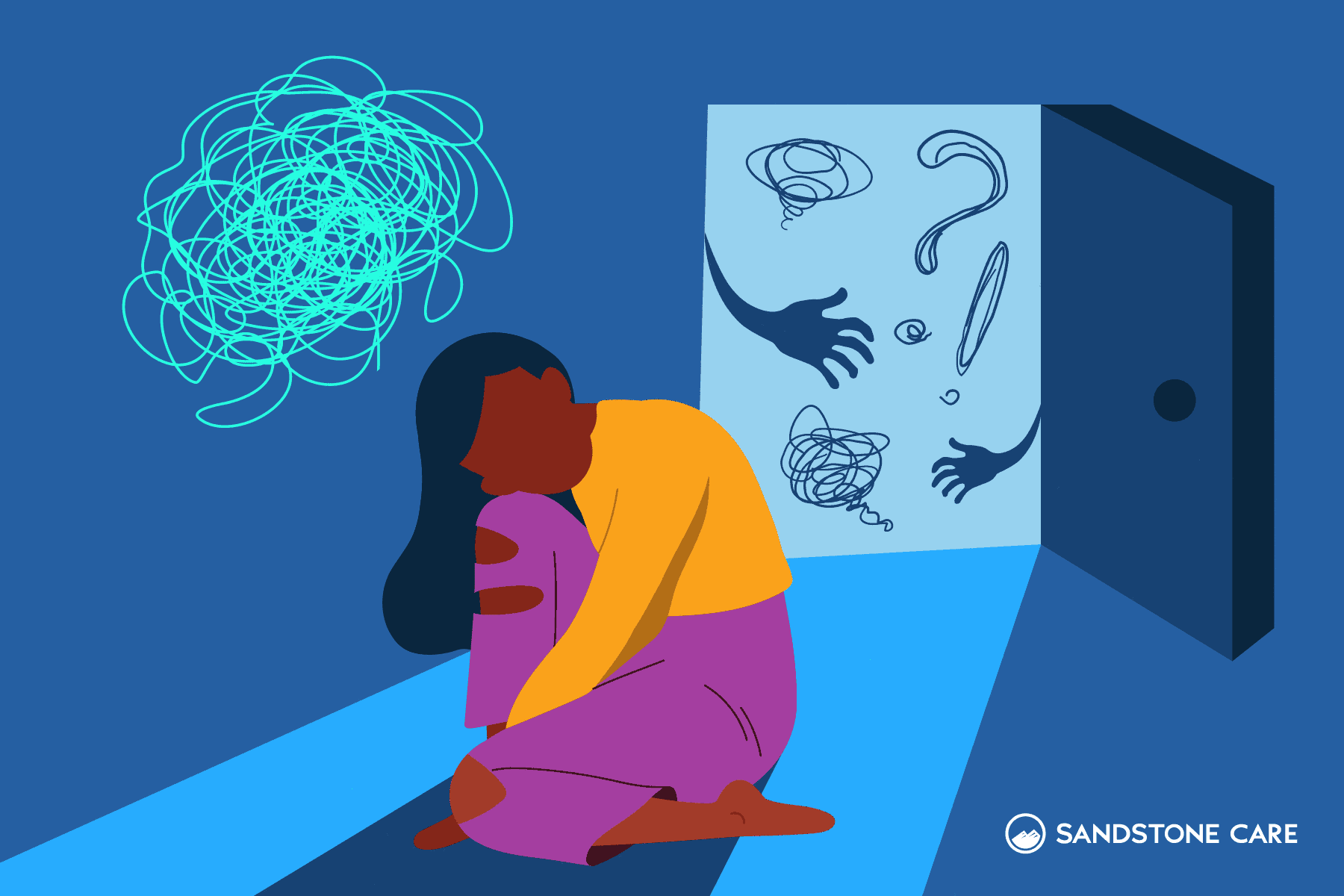Narcissistic Personality Disorder
What Is Narcissistic Personality Disorder?
Narcissistic Personality Disorder (NPD) is a mental health condition that causes a person to feel superior to others, need constant admiration, and struggle to recognize or care about other people’s feelings.
People with NPD often feel that they are more important or deserving than those around them, which can affect the way they think, behave, and connect with others.
Everyone acts selfish from time to time, that is normal.
NPD is different. It is constant, self-destructive, and incredibly difficult to step away from.
True narcissism is marked by behaviors like:
- A need for praise, attention, and special treatment
- Using or manipulating others to meet personal goals
- Difficulty empathizing with others’ emotions or needs
- An inability to accept fault or consequences for their actions
- Fragile self-esteem that can quickly turn to shame, anger, or defensiveness
It can be difficult to spot narcissism in yourself, especially because it may drive you to blame other people for your symptoms.
You might come across as confident and charming at first, but over time, your relationships may start to feel tense or one-sided.
You might notice that you crave attention or admiration, feel uncomfortable when someone else gets the spotlight, or overreact when you think you are being criticized.
Narcissistic Personality Disorder is often misunderstood as everyday arrogance, but it’s much more complicated than that.
NPD often comes from deep insecurity and a fear of not being good enough.
Recognizing these patterns can help you start showing yourself compassion while also taking responsibility for how your behavior affects others.
Is Narcissism a Mental Illness?
Yes, narcissistic personality disorder (NPD) is a Cluster B personality disorder according to the Diagnostic and Statistical Manual of Mental Disorders(DSM-5).
Other personality disorders in this group include antisocial, borderline, and histrionic personality disorders.
If you’ve ever wondered whether you might have NPD, it’s important to know that only a licensed mental health professional can make that diagnosis.
You might show several narcissistic traits without meeting all the criteria for the disorder itself.
Narcissism often masks itself, and the need to prove to others that you aren’t flawed can make it difficult for anyone other than a trained medical professional to fully understand the signs of NPD in your life.
Who Is Most Likely To Be a Narcissist?
While NPD can affect anyone, it is slightly more common in males. People with narcissistic personality disorder also tend to gravitate to high-status careers and positions of power.
Estimates suggest that 2% of the population may have NPD.
Narcissism appears to be most common among younger males, with older men and women showing less signs of diagnosed narcissism.
People who are drawn to high-status or high-pressure careers (such as executives, lawyers, doctors, politicians, influencers, or performers) may be more likely to develop narcissistic traits.
These roles often bring admiration, authority, and a sense of control that can make you feel valued and powerful.
People who are raised in strict, critical environments may also lean towards narcissism, especially if their caregivers also had narcissistic traits.
You might be more vulnerable to NPD if you grew up feeling like you had to earn love or attention by achieving more, looking perfect, or standing out.
Maybe praise only came when you did everything right, while criticism was constant, harsh, and personal.
Over time, this can teach a child that that power, control, or success are the safest ways to feel valued.
How Do I Spot Narcissism in Myself?
You can spot narcissism in yourself by noticing when your need for control, attention, or admiration starts to seriously damage your relationships.
You might find that you have little to no tolerance for weakness or mistakes, whether its your own or other people’s.
When someone opens up, you might feel uncomfortable by their vulnerability, change the subject, or force the conversation to talk about on how their feelings affect you instead.
You might shut down when criticized, replay conversations to prove you were right, or feel angry when others don’t show enough appreciation.
Narcissism can look like:
- Turning conversations back to yourself or downplaying others’ emotions
- Feeling defensive or attacked by feedback, even when it’s meant to help
- Struggling to handle vulnerability and avoiding emotions that make you feel weak or exposed
- Needing admiration or praise to feel okay about yourself
- Expecting others to meet your needs, but feeling that you do not need to meet theirs
- Using anger, withdrawal, or silence to regain control when you feel rejected
- Apologizing without real accountability, just to smooth things over
- Feeling powerful when admired, but feeling anxious or empty when that attention fades
You might also notice how people react to you. Loved ones may tell you that they feel unheard, manipulated, or “walked over.”
They might accuse you of twisting their words, making everything about yourself, or refusing to admit when you’re wrong.
Your loved ones might be guarded, or stop being honest with you because they’ve learned it’s easier to stay quiet than risk another argument.
But what if you’re just confident? How can you tell whether its your insecurity or their insecurities that is causing the relationship to break down?
It can be easy to confuse narcissism with confidence, but the difference lies in how it affects connection.
Confidence allows you to be open, curious, and imperfect without feeling angry or attacked. Narcissism fears vulnerability so deeply that it replaces it with control, admiration, and distance.
If any of this sounds familiar, it’s important to know that changing them on your own can be extremely difficult.
Narcissism often protects you from pain you may not even realize you’re avoiding, which makes it hard to see the full picture from the inside.
This makes it crucial that a trained mental health professional is helping you to navigate your difficulties.
Am I a Narcissist or Just Codependent?
Narcissists are focused on their own self-image and admiration, while those who are codependent often over-focus on loved ones and neglect themselves.
If your relationships feel unbalanced or emotionally draining, it can be difficult to sort out exactly what the root cause is.
At first glance, narcissism and codependency can look similar: both can involve low self-worth, people-pleasing, and a deep fear of rejection. The difference between these two situations is driven by what you focus on.
If you lean toward narcissism, you might be overly focused on your own image and how others see you.
You may crave admiration, want to feel special, or expect others to meet your emotional needs. When someone pulls away or doesn’t give you the attention you want, it can feel like rejection or disrespect, and you might respond with anger, withdrawal, or control.
If you lean toward codependency, you’re more likely to over-focus on others, you are usually trying to fix, please, or rescue them while neglecting your own needs.
Those who are codependent might find that their sense of worth is tied to how much you can help or be needed, even when it leaves you exhausted.
Here’s how they compare:
- Similarities: Both patterns can involve insecurity, fear of abandonment, and a strong need for approval. You might feel anxious when someone is upset with you or worry about being unimportant.
- Differences: Narcissism centers on being cared for, admired, and seen as special. Codependency centers on caring for others to feel valued.
A narcissist says, “You need to make me feel loved.” A codependent says, “I need to make you love me.”

Is this blog hitting close to home?
We’re here to help.
Types of Narcissism
What Are the Different Types of Narcissism?
There are three main types of narcissism: grandiose, covert, and malignant.
- Grandiose narcissism: This is the classic form of narcissism and what most think of when they hear the term. Those with this type of NPD display traits such as a need for excessive admiration, displays of power, and a sense of entitlement.
- Covert narcissism: Someone with covert narcissism may not be as apparent as the person may appear shy, insecure, or hypersensitive. However, a covert narcissist still has feelings of superiority.
- Malignant narcissism: This is the most destructive form of narcissism. Those with this form may exhibit narcissistic behavior along with aggression, paranoia, and sometimes overlapping traits of psychopathy.
These tend to be the most commonly described types of narcissism in mainstream media, but there are infinite ways for narcissism to show up in your life.
You also may see symptoms from different types happen at the same time.
Narcissistic Personality Disorder Causes
What Is the Root Cause of Narcissism?
Narcissistic Personality Disorder (NPD) is likely caused by a mix of genetics, childhood environment, parenting style, trauma, early attachment issues, and cultural or social pressures that shape how you learn to see yourself and others.
There isn’t one single cause of narcissism. Instead, it usually grows out of the ways you learned to survive emotionally and build a sense of self-worth.
If you grew up with caregivers who were overly critical, rejecting, or emotionally unpredictable, you might have learned to hide feelings of fear or inadequacy behind confidence, perfectionism, or control.
If you were constantly praised, overprotected, or told you were destined for greatness, you may have learned that your value depended on being special, admired, or successful.
Narcissistic traits can also take root in households where achievement, appearance, or reputation mattered more than emotional connection.
Maybe mistakes weren’t tolerated, emotions were seen as weakness, or love felt conditional on performance.
In other cases, childhood trauma, neglect, bullying, or chaotic family dynamics can leave a child feeling invisible. You might focus on making yourself important to try and compensate for that feeling of powerlessness.
As you grow older, these patterns can be reinforced by competitive environments—academics, sports, or career paths that reward status, confidence, and self-promotion.
In that way, narcissism rarely comes from pure arrogance, it’s often a learned form of self-protection. What once helped you survive can become the very thing that keeps you from feeling truly seen, understood, or loved.
Is Narcissism Genetic?
NPD has a genetic component, but how someone was brought up and their environment as a child also play a significant role in whether or not they develop NPD.
It is thought that all personality disorders likely have a genetic component. However, environmental influences such as whether or not you have experienced trauma or abuse also play a huge role in your risk of developing narcissism.
It is extra difficult to determine how big of an impact genetics has on NPD since biological parents are often caregivers.
For example, if you have a narcissistic mother, it is likely impossible to determine how much of your experience is driven by the genes you share with her or the way she raised you since both things happened at the same time.
What Triggers Someone With NPD?
Someone with NPD will often be triggered by criticism, rejection, or challenges to their self-image.
Even small moments, like being left out of a conversation, corrected in public, or told “no,” can feel like deep personal attacks.
These situations can bother anyone, but when you have NPD, the reactions are much more intense. What might make someone else mildly uncomfortable can feel unbearable to you, like proof that you’re being disrespected, replaced, or losing control.
You might react by getting defensive, minimizing others’ feelings, or trying to reassert authority in the situation. What looks like anger or pride on the outside is often an attempt to protect your sense of worth.
Lesser-known triggers can be just as powerful: watching someone else get praised, being asked to apologize, or having someone set a boundary with you.
When a partner says, “I need space,” or a friend gives you feedback, it can feel like rejection instead of a normal part of a healthy relationship.
Boundaries that others see as reasonable might feel like betrayal or punishment.
For example, imagine your boss praises a coworker in a meeting for a project you also worked on.
Most people might feel a twinge of disappointment. But for you, that moment could feel explosive.
You might think, “They’re overlooking everything I’ve done,” and find yourself replaying the situation all day, yelling at others over it, or giving your coworker the silent treatment to try and feel like you are in control again.
Common triggers include:
- Being criticized, corrected, or questioned
- Feeling ignored, dismissed, or left out
- Seeing others receive attention or praise
- Losing control or being told “no”
- Having boundaries set by others
- Being asked to apologize or take responsibility
- Feeling embarrassed or exposed in front of others
Is NPD a Coping Mechanism?
Most likely, yes. It is thought that NPD is a defense against low self-esteem and insecurities. However, it is an extreme and rigid defense that develops early on in life.
While NPD may be a coping mechanism, it is considered a maladaptive coping strategy that pushes people away, damages relationships, and prevents genuine connection.
Is ADHD Related to Narcissism?
While ADHD is a different mental health condition, some of the traits associated with ADHD, such as impulsivity and emotional dysregulation, can overlap with narcissistic behaviors.
It’s important to note that ADHD is considered a neurodevelopmental condition, whereas NPD is a personality disorder.
ADHD is about how the brain is wired, whereas NPD is about someone’s personality structure and coping mechanisms.
Is BPD Related to Narcissism?
Borderline personality disorder (BPD) and NPD are both considered Cluster B personality disorders and share similarities, such as unstable relationships and fragile self-esteem.
Cluster B personality disorders are characterized by dramatic, emotional, or erratic in nature.
However, with BPD, the root cause of behaviors stems from a fear of abandonment. In narcissism, problematic behaviors are centered around trying to gain validation or praise.
What Kind of Childhood Trauma Causes Narcissism?
It’s believed that NPD comes from childhood traumas of parenting extremes: excessive admiration, or excessive neglect and unmet emotional needs.
If you grew up in a home where you were constantly praised or treated like you could do no wrong, you may have learned that love and attention came only when you impressed others.
Maybe your parents showed affection after good grades, trophies, or performances, but pulled away when you fell short.
Your achievements, looks, or charm might have been praised more than your kindness or effort. You may have been told you were “too special” for normal rules, or compared favorably to others in a way that made humility feel unsafe.
On the opposite side, if you experienced neglect, harsh criticism, or emotional abuse, you may have learned to protect yourself by becoming distant, guarded, or controlling.
Maybe you were ridiculed for showing emotion, made to feel like a burden, or ignored unless you were excelling.
You might have learned early that being vulnerable led to rejection or punishment, so you built a strong exterior to keep others from seeing how deeply you were hurting.
Other experiences can also shape these patterns. Inconsistent parenting, where affection came and went without warning, can make you constantly seek reassurance and approval.
If you were forced to grow up too quickly, caring for siblings, mediating adult conflicts, or taking on responsibilities beyond your age, you might have learned that being needed was the only way to matter.
In many ways, narcissism begins as a way to cope with deep emotional instability. Whether you were overvalued or undervalued, idealized or ignored, the underlying message was the same: Love is not unconditional, it has a scorecard, and you better not lose.
Signs of Narcissism
How Can You Tell if a Person Is Narcissistic?
Someone who is narcissistic will likely display patterns of manipulation, a self-centered attitude, disregard the needs of others, need admiration, and struggle with empathy.
That may look like:
- Manipulation: They might guilt you into doing what they want, twist your words during arguments, or act like a victim to gain sympathy.
For example, if you set a boundary, they might say, “After everything I’ve done for you, this is how you treat me?”
- Self-centeredness: Conversations tend to circle back to them.
If you share something personal, they may interrupt to tell a story about themselves or quickly shift the focus to their achievements or problems.
- Disregard for others’ needs: They may expect flexibility from everyone else but refuse to change their plans for others.
For instance, they might cancel plans without notice or expect support during their struggles but disappear when you need help.
- Need for admiration: They may constantly seek praise or validation, posting about their accomplishments, fishing for compliments, or feeling deflated if they’re not recognized.
- Lack of empathy: When others are upset, they might respond with irritation or detachment, saying things like, “You’re overreacting,” or “That’s not a big deal.”
What Are Some Warning Signs of Narcissism in Teens?
Narcissism in teenagers shows up as entitlement, manipulation, and a strong sensitivity to criticism that causes real problems in relationships, school, and daily life.
While it’s normal for teens to care about popularity, independence, or how you come across to others, narcissistic traits can take those needs to an extreme.
You might react strongly to rejection, use others to get ahead, or feel like you need constant praise just to feel okay about yourself.
You might notice patterns like:
- Explosive reactions to criticism, like yelling, storming off, or refusing to take responsibility
- Using or manipulating friends to gain attention, status, or control
- Believing you’re better than others, expecting special treatment from teachers, coaches, or peers
- Constantly comparing yourself to others or obsessing over success, appearance, or popularity
- Craving admiration through social media, achievements, or looks, and feeling upset or ignored when it doesn’t come
- Struggling to empathize, brushing off others’ feelings or frustrations
- Exaggerating accomplishments, like stretching the truth about your skills, or bragging to get recognition
For example, you might take over a group project and dismiss what others contribute. If a teacher gives you feedback, you might feel angry or embarrassed and accuse them of “playing favorites” or classmates of “slacking off.”
The difference between normal teen behavior and narcissistic patterns comes down to the intensity and impact of their sense of self-importance.
It’s normal to want approval or independence, but if you find that you can’t handle criticism, struggle to take responsibility, or push others away when you don’t get the attention you want, it could be a sign of narcissism.
Ask yourself, when you are challenged, do you reflect? Or do you double down and feel that others are out to get you?
What Are The Top 10 Narcissistic Traits?
While there are several traits of a narcissist, ten of the most common signs of narcissistic personality disorder include:
- Grandiosity
- Lack of empathy
- Sense of entitlement
- Need for validation
- Need to be the center of attention
- Manipulation
- Gaslighting
- Self-centered decision making
- Hypersensitive to criticism
- Exploitation of others
What Does a Narcissist Do for Attention?
A narcissist may seek attention by boasting, through exaggeration, or by playing the victim.
Narcissists often cause drama and attention, create conflict, or use charm to gain attention for themselves.
If you are a narcissist, then your self-worth relies heavily on external validation.
You will have a constant need to behave in ways to bring positive attention back on yourself and deflect negative attention to others.
How Do Narcissists Behave With Their Families?
Narcissists are often controlling and struggle to acknowledge the needs of their loved ones.
Within a family structure, a narcissist may pit family members against each other. They often disregard boundaries.
If a parent is narcissistic, their behaviors may include:
- Blaming everyone but themselves for their problems
- Trying to appear like a good parent to others or be well-liked, but the extreme opposite behind closed doors
- Acting immature and selfish
- Always needing the conversation to be about them
- Making their children feel guilty for not talking about how great of a parent they are
- Taking advantage of their children and others
- Failing to provide emotional support
- Becoming angry when their family members tell them how they feel
- Always wanting control over everyone and getting mad if they feel like they are losing control
How Do Narcissists Treat Their Partners?
Narcissists may treat their partners in a hurtful cycle of idealization, followed by devaluation, and then discard.
If you are a narcissist, you may start a relationship by being deeply affectionate and showering your partner with attention. However, as time goes on, this “hopeless romantic” phase collapses, and you become emotionally distant.
Gaslighting, which involves making someone question their reality, is also a common sign that a relationship has narcissism involved.
Narcissists will often deny events happened or change stories so that they aren’t accountable or are the victim.
Do Narcissists Apologize?
Narcissists rarely offer a sincere apology. Instead, they often apologize to serve their own self-interests.
If you find that you struggle to apologize, or that your apologies are often shallow and full of excuses, that doesn’t necessarily make you a narcissist.
However, if you find it difficult to feel any remorse and instead use apologies as a way to regain control over a situation, it may be a sign of narcissism.
How Does A Narcissist React When They Can’t Control You?
When a narcissist loses control, they may respond with anger, gaslighting, or withdrawing (e.g., silent treatment).
Losing control means their sense of power is threatened and can trigger an extreme reaction.
If you struggle with losing control, you may find yourself guilt tripping others, manipulating those around you, or frequently abandoning relationships.
This can increase feelings of loneliness and make it more difficult to find stable relationships in the future.
How To Deal With A Narcissist
What Damage Can A Narcissist Do To You?
Narcissists can cause a lot of damage to your self-esteem and identity, sometimes leading to mental health conditions such as anxiety and depression.
Damage they cause may include:
- Emotional exhaustion
- Loss of self-worth
- Trauma
- Attachment issues in future relationships
- Anxiety
Narcissists often manipulate situations and other people to believe that they are in the wrong.
They will often have you question yourself and blame yourself for things that went wrong when it wasn’t your fault. They may isolate you from family and friends.
A narcissist can make you feel invalidated, guilty, ignored, and insecure. A narcissist’s behaviors can hurt a person’s self-image.
In the case that a person tries to remove themselves from an unhealthy relationship with a narcissist, they will often make you feel guilty for moving on.
Having a relationship with a narcissist can also contribute to or worsen mental health conditions such as anxiety disorders and depression.
Adolescents and children who grow up around narcissists also commonly struggle with problems such as codependency in future relationships, poor boundaries, trouble expressing emotions, trust issues, low self-esteem, an impacted sense of self, extreme stress, and more.
How Do You Stand Up to a Narcissist?
The best way to stand up to a narcissist is to stay calm and set and hold onto firm boundaries.
Consider these steps when standing up to a narcissist:
- Stay calm: Many narcissists are pushing for you to react. Do not give them that power.
- Set boundaries and keep them: Remember, a boundary is what you do. For example, with a narcissist this may look like stating that you will walk away for five minutes every time you are yelled at.
- Speak clearly and directly: Less is more. Many people get sucked into an over-explaining loop, trying to get their partner to see their side of things.
Taking a step back does not mean you don’t love that person. Remember, it is ok to protect your peace and walk away.
How Do You Get a Narcissist To Respect You?
You may not be able to get a narcissist to respect you since narcissism always looks to blame other people for their weaknesses.
If you demonstrate that you won’t give in to their games, they may become angry, reactive, or cold.
However, you can find ways to respectfully navigate your relationship by:
- Setting and sticking to consistent boundaries
- Valuing your independence
- Walking away from unimportant arguments
- Staying confident, even if you don’t always feel it on the inside
What To Say To Disarm a Narcissist?
To disarm a narcissist, use short and simple neutral statements such as “I understand what you’re saying.”
Other phrases might include:
- I see what you mean.
- We see this differently, and that’s ok.
- Let’s stay focused on the solution.
What Should You Not Say to a Narcissist?
Avoid over-explaining, engaging and falling into an argument with a narcissist, and situations where you are begging for validation from them.
A heated response can work like fuel for a narcissist. The best way to neutralize a narcissist is by not giving them the reaction they are looking for.
Examples of what to avoid include:
- Calling them out and insulting them, especially in front of others
- Apologizing because they want you to, even if you haven’t done anything wrong.
- Giving in to them when they’re shouting at you.
How Do You React to a Narcissist?
One of the most important things to remember when reacting to a narcissist is to avoid engaging in power struggles and remain neutral.
For your own well-being, it is essential to prioritize personal boundaries.
Stay emotionally detached and avoid getting trapped in their power struggle. Consider reaching out to family, friends, or a therapist for support.







